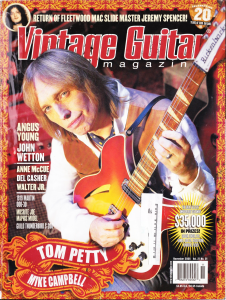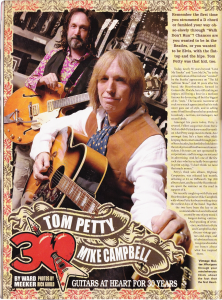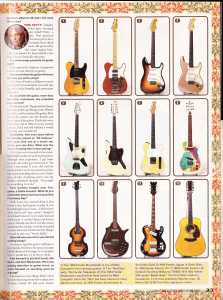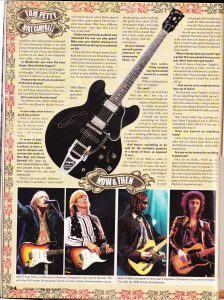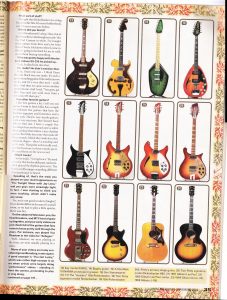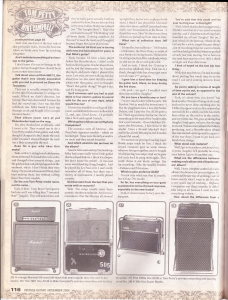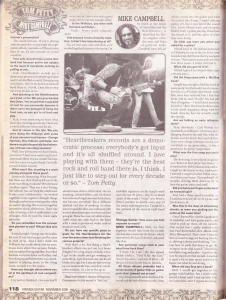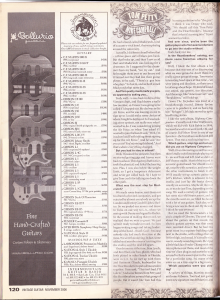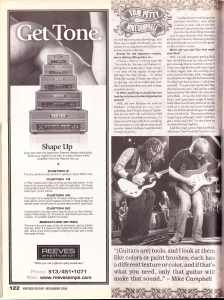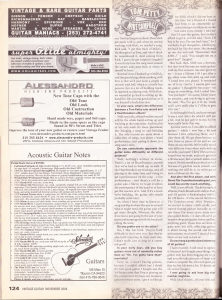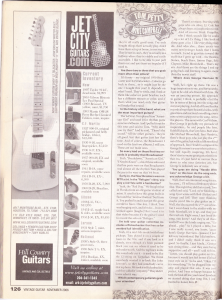Editor's Note: Thanks to Sue Reaney for the scan!
Download the PDF! (big file)
Tom Petty | Mike Campbell: Guitars At Heart For 30 Years
By Ward Meeker
Vintage Guitar - November 2006
Remember the first time you strummed a D chord or fumbled your way oh-so-slowly through "Walk Don't Run"? Chances are you wanted to be in the Beatles, or you wanted to be Elvis, with the flattop and the hips. Tom Petty was that kid, too.
Today, nearly 50 years beyond "Love Me Tender" and "Love Me Do," he is the personification of the rock star "created" by the Beatles' appearance on "The Ed Sullivan Show." and 30 years after his band, the Heartbreakers, formed in Gainesville, Florida, he is still making an impact, still being a force in a medium famous for devouring all but the biggest of its "stars." The laconic raconteur of rock very much appreciates that his style never goes out of style, and in selling some 50 million albums he has pandered to nobody—not fans, not managers, not record labels.
Amongst his peers today, Petty is revered. Fellow songwriters from Stevie Nicks to Bob Dylan have waxed fervently on what Petty songs mean to them. And amongst fans, he's a hero who, while keeping them entertained through parts of four decades, has battled to hold down the retail prices of his albums and concert tickets. His tours are not sponsored by corporations, and his songs are not used in advertising. And he's one of the few rock stars who has actually been quoted in print saying, "I don't think we need that much money."
Petty's third solo album, Highway Companion, was released last month, debuting at #4 on Billboard's Top 200 album chart, and he and the Heartbreakers spent the summer on the road in support of it.
We recently caught up with Petty and Heartbreakers guitarist Mike Campbell, with whom Petty has been working since the earliest days of the band. Together, the two have been the key to an unmistakable rock and roll sound created by one of pop music's longest-lasting entities. And speaking of reverence, one listen to Petty and Campbell as they discuss vintage guitars and amps, and it's obvious these are two guys who make no bones about what has inspired them.
Vintage Guitar: What goes through your mind when you think about the fact that the first Heartbreakers album is 30 years old come November?
Tom Petty: [laughs] What goes through my mind? Well...a lot. That question has been put to me a lot lately. But I think we're still powered by the same engine basically, you know? It's been rebuilt a few times, but it's basically the same.
You write songs primarily on guitar right?
Well, quite a bit. Highway Companion I think I wrote entirely on guitar.
How much does the guitar influence the way you write songs?
Well, they all make a different sound, you know? So sometimes you pick one up and it feels friendly, and sometimes it doesn't.
Do you think the guitar, more than any other instrument, has propelled your success?
Absolutely, yeah. The guitar has always been the archetypal thing, to me. When I was little, cowboys played the guitar, Elvis played the guitar, and the Beatles and Stones played the guitar. The Beatles were a big deal, and in 1964 everyone wanted a guitar. Rock and roll without it would be kinda sad, wouldn't it?
Absolutely. And even years before the Beatles played on "Ed Sullivan," your aunt took you to a movie set, where you saw Elvis. What was the effect of seeing him in that setting?
Well, it got me interested in the music, but it didn't make me want to play guitar. Through that experience, I got some records and really got interested in '50s rock. I was about 11 years old, and the music was five or six years past its prime, but I started finding old records. I didn't have an idea of playing until I saw the Beatles, and then I thought, "This might be something I can do."
Your parents bought your first guitar, a Stella acoustic. What do you remember about opening it up on that Christmas Day?
Well, I was very excited about it. But it was a very hard guitar to play. It was frustrating because it was...it didn't have what you'd call "easy action" [laughs]! And I don't know if I ever really learned much on it—I couldn't figure out how to tune it. I finally just threw it in the corner and got an electric Kay. And then I started to move forward. I think the first thing I learned to play was "Wooly Bully."
How old were you when you started writing songs?
As soon as I got the guitar and I knew a few chords, I tried to write songs, because I didn't know a lot of songs. So in my spare time, I would just try to invent them.
Fast forward to your first bands, the Epics, and then Mudcrutch. Were you paying attention to guitar tones, or more focused on sounding good as a group?
I focused on everything. That's when we were learning about how to play, how to have a band. We had some Fender amplifiers, they made a pretty cool sound. We just discovered things as we went along. One guy had a Gibson, one guy had a Fender, so you'd learn the differences and how to use them. It was a fantastic time, really... very exciting.
In Mudcrutch, you were the bass player. How did that happen?
Nobody else wanted to do it [laughs]! So I thought, "Well, okay. I'll do it." And I loved it. I still love to play the bass.
On your solo records, do you do most of the bass playing?
Usually, but not on Highway Companion; Jeff Lynne played bass on this one. But I do still play from time to time.
Got a personal favorite bass?
The Höfner Club, which I think we've used for everything for the last 10 years now.
In your view, what makes a good bass player?
Well, it's mostly about the groove, isn't it? Holding the groove down and a sense of melody, tone—all of those things.
In terms of bass players in the Heartbreakers, is there a way to compare and contrast the styles of Ron Blair and Howie Epstein? (Ed. Note: Epstein replaced Blair in 1982, and passed away in 2003. Blair resumed the role soon afterward.)
They're not noticeably different. I think Blair is probably more locked with the drummer, where Howie played more like a guitar player. Howie was a great bass player. Blair has a different kind of tone—very clear. He's a lot of fun to play with.
Is there any particular guitarist who influenced the way you play guitar? Mike says your rhythm playing is so solid that it frees him up to concentrate on fills.
I listened to lots of John Lennon, Keith Richards, Brian Jones. Brian Jones was a really good rhythm guitarist, I thought, and rhythm guitar is a lost art, you know? But I really concentrated on being...I guess, because I'd been a bass player, I wanted to play rhythm in a real solid way. So our music is really based on that rhythm guitar, and everything else grows from there. If I'm showing the band a new song, it's based on rhythm guitar, and they fill in around that. But I stick really closely to the groove with the instrument.
Do you consider yourself a guitar collector? Or are you more likely to buy something because you need a certain sound for a certain song?
Well, you only need one, don't ya' [laughs]?
Oh, yeah!?
I don't think you need more than one. But I love 'em, ya' know? And I've always bought one whenever I had the money. As things progressed for the Heartbreakers, any time Mike and I would run across something we liked, we'd get it. And one day, we looked up and there were hundreds of them! But the truth is, ours is a working collection. I don't buy something unless it works, and I can use it.
And there's something to be said for the aesthetic qualities of a bunch of them, as opposed to one...
Well, I do see them as works of art. I worked at a music store for a while when I was 15 years old, and I gained a pretty good knowledge of instruments. It used to be people didn't really want much for them because they were old. Then, of course, that turned around years later, where the old ones became much more expensive than new ones. The truth is the new ones just aren't as good, are they? I want to play good instruments, and I don't have much patience with new instruments.
When's the last time you couldn't get a guitar that you wanted because you just didn't have the cash handy?
God, it's been a long time [laughs]... Once we started to make records, we always had cash, so that wasn't a problem. I think when I was a teenager, there were probably dozens I wanted but couldn't afford...
...And you've since obtained every last one of them?
Pretty much, yeah (laughs)! And now if I see something that's really special, I buy it just because I don't want it to be lost to the sands of time, or be put behind glass or something. I think it's better that they get used. It's kind of a noble pursuit, in a way.
But I don't really buy anything unless I think I'm going to use it. If there's something I don't think I'd ever use, I usually don't buy it.
Have you passed on anything lately?
Yeah, I do it all the time. I passed the other day on a Mary Kaye Strat. I just don't like the way they look...never really wanted one.
Are you on the lookout for anything in particular?
God, let me think... We're on this quest to find another bass as good as this Höfner Club we've got. It's so good. We've found more of them, but none quite have the same sound and this feel. I'd really like to find one of those. I did buy a few guitars while I was [on the first leg of the Highway Companion tour].
What sort of stuff?
I bought this Rickenbacker six-string bass from the '60s. It's a semi-hollowbody, and I'd never seen one before.
Where did you find it?
At Gil Southworth's shop. I buy a lot of stuff from him. I also bought an early-'60s Les Paul Custom in white. I've bought many guitars from him, and a lot from Norm Harris. He knows when I come in that it's going to be hard for me to walk out without buying something.
Mike was pretty happy with the dot-neck Gibson ES-335 be picked up...
Yeah, I talked him into that.
Oh, really? He didn't mention that.
Yeah, I have one too—I think I have the only black one ever made. It's such a good-sounding guitar. I like really narrow necks, and it's a very thin neck—really nice. And then we came across another sunburst one. And I said, "You gotta get this! You can't just walk away from a dot-neck 335 that nice."
Any other favorite guitars?
I like Vox guitars a lot. I tell you one guitar I want to find; Mike has a couple of different Vox guitars that have the built-in repeaters and fuzztones, and a palm wah. They're very sturdy guitars, with a very nice tone. But I haven't been able to find one. I have a couple Vox teardrops I use on the road; one's a white three-pickup that makes a nice rhythm guitar. But Mike has some that make all these sounds. I think they made it in a few different shapes—there's a teardrop and a 335-style. That palm wah is really cool, and the fuzztone in them sounds great. We used them on the new record.
Which tracks?
On the single, "Saving Grace." He used a Vox for the slide part, and actually I played the rhythm part on it. The fuzz is a really unique-sounding, different than anything I've heard.
Speaking of, that's the track you played on your recent appearance on "The Tonight Show with Jay Leno," and you guys were amazingly tight. In fact, I was starting to think you were tracking, which didn't make any sense.
No, we're not good trackers [laughs]! It was kinda different because it's a small room, so we had to play a little quieter. But it was fun.
Ob the subject on television, you, the Heartbreakers, and the MTV kind of grew up together, and your early videos are just chock full of the guitars that fans came to know pretty well through the years. For instance, you played Vox Phantom in the video for "Refugee."
Well, whatever we were playing at the time, we were usually playing in a video.
Many of your videos are today considered groundbreaking, in retrospect. A good example is "You Got Lucky," which was rather high-concept in an era when artists were largely during "performance" videos—standing in front of the camera, pretending to play or sing along.
Well, that was kind of the first rule of that particular video. It was the first one where we broke away from lip-synching altogether.
And it included something of a homage to the guitar...
I don't know if it was a homage to the guitar, but we thought there should be at least a token instrument.
Talk about your red Rick 66/12, the guitar that's very closely associated with you and is pictured on Damn the Torpedoes.
That one is actually owned by Mike. It's the third Rickenbacker 12-string ever made. Which we didn't discover, but George Harrison discovered because he had the second one. Ours was the first solidbody one. Mike found it years ago through an ad and bought it for a couple hundred bucks.
That album cover sort of put Rickenbacker back on the map.
Yes, they thanked me prolifically... and I mean a lot. They wanted me to do a Tom Petty model of that guitar, and I did, though I changed it a bit; I made the neck wider because I always thought the neck was a little cramped at the end.
Even for a guy who likes thin necks?
Yeah, with a 12-string I need a little more room at the end. So I made the neck wider, and changed a few cosmetic things... put the gold pickup and gold pickguard on the sunburst, which I don't think they were doing. They made a thousand of them, then kept making them, but without calling them Tom Petty models.
So the non-Tom Petty model specs out the same...
Yeah, it does. I saw Bruce Springsteen had one and I was telling him "I invented that!" [laughs]. They still make them, and they're really good, actually. I still use mine in the show. But my favorite Rick is the semi-hollow blond one I played [on "The Tonight Show"]. That's the one I used to record "The Waiting" and all those classic 12-string numbers. It's the one I've used the most, and I bought it becuase Roger McGuinn played one.
The sunburst '64 strat you're touring with now and have played for years, is that Mike's guitar?
Yeah, because I'd been a bass player before the Heartbreakers, I didn't really have an electric guitar. I had a Gibson Dove, and he had the Stratocaster. So I started playing it, and you're right, I played it for years. Last year, we were talking one day about how we saw some old film somewhere with that guitar, and we thought, "How's that guitar doing?" We got it out, and it's doing great.
So if someone said you had to pick three or four electric guitars to record with for the rest of your days, which would they be?
I think they would be a really good Telecaster, and definitely the semi-hollow Rick 12, and... gee, I don't know... I'd probably take a Strat and a good Gretsch.
Which guitars did you use on Highway Companion?
The acoustics were all Martins—the Tom Petty signature models—which we had just got. Those were the only acoustics we used, and they sound beautiful.
And which electrics can we hear on the album?
I used a Telecaster and my Vox teardrop. Mike had some really weird little guitar that he played slide on. I think it's a Supro, but don't know the model—it was just some weird-looking thing [laughs]. And he played his Les Paul a bit. I can't really remember all of them, but there was a variet of instruments. I mostly played acoustic.
Did that stem from the fact that you wrote with an acoustic?
Yeah. The songs mostly came from acoustic rhythm standpoint. And it was a coincidence that the Martins all showed up right then, but we were so pleased with them. I think I just played the Telecaster after a few times, and Jeff Lynne had some really nice Stratocasters at his house—I think they were '54 to '56; there were three of them we picked up from time to time.
What sort of collection does Jeff have?
It's smaller, but really nice—'50s Fenders—a Telecaster, the three Strats, a couple of nice Fender six-string basses. His favorite 12-string is the Tom Petty solidbody, which we did use on the record quite a bit.
And so yeah, I think the 12-string is always that solidbody Rick. That was it, I think, though Mike has always got some sort of exotic s*** going on.
I gave him a hard time for keeping his guitar tech, Steve, so busy during the live show.
Oh yeah—my god—I wouldn't want that responsibility [laughs]!
Do you have a favourite amp or two?
I'm very much in love with the early-'60s Fenders. Not as much as the brown ones—I like the piggyback ones. I love the Fender Deluxe, and I play the Vox AC30 quite a bit. That's a good amp, but for me, there's something in the tone of the Fender tubes that's just fantastic—those blackface Deluxes, the Princeton... I love those in the studio. I have a 50-watt Marshall that I really like, a little '60s amp in red. It makes a beautiful sound.
We started out playing those big Super Beatle amps made by Vox. I think the record company gave us some money when we first got together, and we bought 10 of these big Vox amps. And we've gone full circle back to using them again. They really throw it out nicely onstage. But for recording, I like the smaller Fenders—Deluxes and Princetons.
Which is your preferred AC30?
I'm not sure what year that is, exactly, but it's late-'70s model.
So far, has everything on tour gone as planned in terms of crowd response, especially to the new tracks?
Yeah, it's been insane. In fact, over-the-top great.
You've said that this could well be your last big tour, is that right?
Well, I think that has been exaggerated...I think I said that in a very tired moment one day, and it's become something that's hounded me all year [laughs]! But no, I don't think it's the last tour. I think it's the last one for a while, simply because there's a lot of recording projects I want to finish, and they don't get finished when we put half of each year into touring. We've been on the road four years in a row. Still, I think we'd get sick if we didn't tour.
I kind of keyed on the last big tour thing...
Well, that may be true, I'm just not nuts about putting that much time in on the road. I can see it coming down to fewer shows.
So you're talking in terms of length of time you're out, as opposed to the size of the venues?
Yeah, it's about time, you know? You look up after 30 years of being on the road, and you've never done anything else. So I'd like the opportunity to live a somewhat normal life for a while; out life has really been either on the road or in the studio, and very little else. We grew up doing this (laughs)! And again, we have a lot of songs to record. We have a live album that Mike's producing, and a Heartbreakers album that was started a year ago and is a quarter of the way done. I want to get back and finish those things.
What about solo material?
Well, I get to do a solo record about every 12 years [laughs]. It'll probably be a long time before I get to do another one.
What are the differences between making a solo record and a Heartbreakers' album?
Well, I have complete control of a solo album; the democratic process is gone. It's a more deliberate way of working, I sort of know exactly what I want to do. It's also a very quick way of working—Highway Companion was three months. It didn't take long at all because I went in with everything written.
How about the difference from a listener's perspective?
The sound textures. If you're playing with the same six or six people throughout an album, you make a different noise than if, say, it's just yourself on several overdubs.
Your solo records have a more laid-back feel because you're not subject to the input of everybody pushing or pulling at you.
Yeah, Heartbreakers records are a democratic process; everybody's got input and it's all shuffled around. I love playing with them—they're the best rock and roll band there is, I think. I just like to step out every decade or so.
And speaking of the Heartbreakers as a band, in the '80s you guys backed Bob Dylan. You've said that it was kind of cool for you personally because it didn't carry the pressure of being the front man, so you got to sit back and play.
Yeah, it was interesting to know what that's like, backing somebody. There was a whole different viewpoint for me.
And of course in the late '80s you were doing the Wilburys with some of your personal rock heroes—George Harrison, Roy Orbison, and Dylan. Are there a couple of especially fond memories of those recording sessions?
Well, they all became my dear friends, you know? There were some long friendships made there. It was a wonderful time, and that was a very good band. I'm really proud of those records.
What was it like, standing in a room playing alongside those guys?
It was really interesting. What I remember most was that all of us fell out of the front-man thing, you know? We were band members again. That was a nice feeling, like nobody was carrying the whole load. It was a very collaborative—we worked together, wrote together, thought things through, and we were even together when we weren't playing. We were just together around the clock, all the time. There was a lot of energy, a lot of enthusiasm, a lot of laughs. Still, we took the music quite seriously.
Do you remember how the concept was pitched to you? Whose idea was it?
It was George's. George was the leader, for sure. It was his concept, and he came to each of us. And I don't think the Wilburys was really about who we were, it was more about that we were friends, and we enjoyed being together. It worked because everyone knew each other, and were hanging out before there was a band. Instead of playing music in the living room, we took it to the studio.
Have you ever thought about where you sit in the pantheon of rock songwriters?
I try not to [chuckles]... because that'll wear you out. I just try to write a good song, which requires enough effort.
In the Wilburys, you were with Harrison and Dylan...
Yeah... Pretty good company, huh?
And because it was a friendly situation, it didn't feel intimidating at all?
No, we were pals. Like with Bob, we'd worked together for years at that point. I'm always in awe of him, of his talent. He's an amazing, talented fellow, and I probably learned something from everybody there, just because everybody has a different method and way of working. So when you're exposed to that, you walk away with a much broader perspective than you had going in. Those few years of collaboration really made me come back to the band with a more experienced, wider scale of music to work with.
Do you have any specific plans or goals for the Heartbreakers for the next few years other than finishing the various projects?
Well that's a lot. Just doing a Heartbreakers album can put you in a home [laughs]! It's a big chunk of work. Once I get in the studio and get working on something, I get inspired and can do all kinds of things, but it usually has to wrap up in a nationwide tour, which is a whole other mindset. It's a lot to live up to.
Mike Campbell
As much as the music of Tom Petty and the Heartbreakers is identified by Petty's singular voice, the tone and licks of guitarist Mike Campbell have left an indelible signature on the band's work over the last 30 years—they're as much a part of the music's "voice" as Petty's. Petty's partner in nearly every step of the music-making process, Campbell is the epitome of the musical right-hand man.
Vintage Guitar: How were you first exposed to music?
MIKE CAMPBELL: Well, my first exposure would have been the records my dad played around the house, which were mostly Elvis and Johnny Cash, stuff like that.
Any particular songs stick on your mind from back then?
"I Walk The Line." He also played Buddy Holly's "That'll Be the Day," "Fool's Paradise," and lots of Elvis—all the great Elvis/Scotty Moore records.
All those albums probably had a whole bunch of guitar licks or guitar parts that jumped out at you?
Yes, I always loved Luther Perkins. The sound and the feel of those records. I was always tuned into the guitar and what the guitar was doing. I wasn't playing guitar yet, but I just loved the sound of it, Scotty Moore stuff, and of course Buddy Holly's guitar playing. I liked just the sound of it, and the spirit of what they were doing.
So what age were you when you asked for a guitar?
I think I was 16. My dad was stationed in Okinawa, he was in the Air Force, and he picked up a $60 Goya electric and gave it to me. That was my main guitar for the first three years... I wish I still had it.
When did you get rid of it?
I think I gave it to a friend when I got a Stratocaster...
Did the Goya come with a Mel Bay book?
I might have bought a Mel Bay book at some point, but the book I most remember was a Carl Wilson chord book. I met him years later and told him I had that book, and he said, "Really? My dad put that all together—I didn't have much to do with it." But I liked that book because it had chord diagrams, along with his hands showing how he actually made the chords.
Are we talking an early influence there?
Yeah, absolutely—Carl Wilson was absolutely an influence. Of course, we're skipping ahead to the mid '60s, with the Beatles and the Beach Boys and all that. They were a huge influence on me and everybody in my generation... it was a great time for guitar inspiration.
What was the first song you could play?
The first song I ever played on guitar was "Baby Let Me Follow You Down." A friend had the Bob Dylan record, and he taught me the chords to that. And maybe I learned a couple of other Dylan songs. And then, you know, I learned stuff off records, slowing them down to try to hear the guitar parts and stuff.
Did you hold your finger on the label as it would spin?
No, I had a three-speed turntable, so I could slow down 45s to 33 r.p.m., and 33s down to 16.
Was this in the days of strumming chords, or were you picking out the solos at the same time?
Once I learned the chords, I graduated to melodies and lead guitar parts, and tried to pick them up off the records. One record that I really studied a lot was Paul Butterfield's first album with Mike Bloomfield. That's how I learned how to bend strings, by hearing him do it, slowing it down and thinking, "Oh... you have to push this string to make that sound." I learned a lot of phrasing and scales—I just love the way he played on that record. I studied it quite a bit at slow speed and tried to figure out what he was doing.
When did you first join a band?
Well, I would get together in the garage with buddies, but I never really joined a band until I met up with Tom in Gainesville, after I'd gone to college. He had a band called Mudcrutch, kind of a country-rock band, that was playing around the university.
Actually, I did form a band before that—a three-piece sort of blues-jam band. But that broke up, and then I saw an ad that said Mudcrutch was looking for a drummer. So I suggested to the drummer from my band, "Go try out." And he brought them over to our house and it turned out they had lost their guitar player, so he said, "There's a guy here who plays." So I sat in, and we both joined Mudcrutch the same day.
And Tom pretty much made you join, as opposed to asking you...
Yeah, well... it was back in days of the Vietnam draft, and I had drawn a really low number, so I knew I was going to be called if I dropped out. My dad was in the Air Force, and he was leaning on me to sign up so I could make some choices of where I might be deployed. So I was looking at my options, not really sure what I wanted to do. I was considering joining the Air Force, so when Tom asked if I wanted to join the band I said, "Well, I'm in school and I'm thinking about signing up for the Air Force." And he said "Are you crazy? You're joining this band." And that's where everything changed.
But you had to stay in school?
Well, I finished the semester, but then we started getting gigs and I never went back to school. Then I got my draft notice, took the physical, and failed the hearing test. Plus, I was also below the weight limit, so I got a temporary deferment and never got called back. So I have to give Tom credit for talking me down the other path.
What was the next step for Mudcrutch?
We made some demos, sent them out to a bunch of record companies, and got rejected by almost everybody except for London and Denny Cordell's label, Shelter. So we pooled out money and drove to Tulsa on our way to L.A., where we met up with denny and signed to Shelter. In the course of making that record, we realized that we were so green. We just weren't ready to make a record. So Tom began writing songs and taking leadership of the band—thank God—because nobody else had much direction at the time. We were floundering. In fact, some of the band members weren't cutting it in the studio, and the deal fell apart.
Our drummer at the time, Stan Lynch, and Ron Blair, our bass player, who had both played in other bands in Florida, were in L.A. So we met up with them and Benmont (Tench, keyboardist for the Heartbreakers) to put a demo session together. Tom said, "This isn't bad. I'll take it." And so we formed Tom Petty and the Heartbreakers around that group of people. But it wasn't like Tom had this burning ambition to be "the guy." I think it was Denny who said, "We should call this 'Tom Petty and the Heartbreakers,' because that's what it's turning into." It just seemed to evolve.
And ever since, you've been the guitar player who Tom seems reluctant to go into the studio without.
Yeah, lucky for me.
In the Heartbreakers' catalog, are there some favorite albums for you?
Well, I liked the first album a lot because that was sort of us dicovering what we were gonna be. And I think it's really a great group of songs. Tom was in interesting head space at that time—we were young and idealistic, so there are a lot of songs about hope. We kind of found our sound, our groove, our direction. And the songs, like "American Girl" and "Breakdown," still hold up.
Damn The Torpedoes was kind of a breakthrough record. Jimmy Iovine came in to produce it, and we had a big hit ("Refugee"). It kind of moved us up to headlining status.
I like the new album, Highway Companion—it's really cool. I like Wildflowers, which we did with Rick Rubin in 1994, because he was fun to work with. Oh, and of course Full Moon Fever is one of my favorites—the first album we did with Jeff Lynne. That was a real exciting time.
Which guitars, amp rig and setups did you use on Highway Companion?
Well, it's an interesting record because there's really only three people playing on it—me and Tom and jeff. And we did it at Jeff's home studio. Most of the record is acoustic-guitar based. We'd build tracks up, usually with acoustics, and overdub the other instruments to finish it off. We'd usually set up acoustic guitars in Jeff's kitchen, which is adjacent to his studio, and just lay the basics down, usually on acoustics. Maybe all three of us, or maybe just Tom, depending on the song. We used a variety of guitars; Jeff has some nice old Stratocasters, and as the months went on, we filled his house with a lot of our guitars. Each day, we'd bring a new one to check out. By the end, I think he was overrun!
But we used the Stratocasters a lot, and a couple of Gibsons. The cool thing about the guitars on that record, the electric guitars anyway, was that some were recorded direct. But he had this great room in a separate building right next to the studio, with ceilings that are 30 feet high, and wood. It's a really nice, warm, woody-sounding room. He'd put a little blackface Fender Champ with two microphones out there, and most of the time we'd just plug in and move the mics around to find a sweet spot in the room for a particular song. So, many of the solos are on a tiny amp in a big room.
Which acoustics were you playing?
A variety of things, Martins mostly, and some Gibsons. Tom had just gotten some new signature-model Martins, and we used those on quite a few things. And there was a couple of Gibson J-45s. On almost every song there was at least one or two acoustic Martins.
Except for the signature models we're talking '60s guitars, or...
I (used) a Martin 12-string from the '70s a little bit. We have an Ovation 12-string that we made into a "high-string"—we took off six regular strings and just kept the high strings—it's called Nashville tuning. If there was three of us playing, one of us might play that. But I don't think there were any vintage acoustics, per se.
Is there anything in particular you look for, in terms of collecting acoustic guitars?
Well, the new Martins we used on Highway Companion are very nice-sounding. But if I had a choice, I'd probably use my old D-28. And I have a 1940 10-18, which is Rick Rubin's favorite. I've done several things with Rick, including the last Johnny Cash albums that are all acoustic-based. On those, I used the older vintage acoustics.
I've played on several things over the years with Rick—most of his acoustic records, and on the new Johnny Cash record, American V, I played on the whole thing. It was me and Smokey Hormel, Matt Sweeney, and Johnny Polansky. Benmont played a lot of keyboards on it. It's a really good, earthy acoustic sound.
When did you and Tom first work with Rick?
Well, I kinda instigated getting Rick into the fold because one time on tour I got a message that he wanted to know if I had any songs that I would want to give to Mick Jagger, who was working on a solo record at the time. Well, I thought it was kind of a strange call, but interesting. So when I got back to town, I called him and said, "I've got some tracks that Tom doesn't want to use," and said he could listen to those if he liked. He came over with Mick—it was the first time I met Rick—and I gave him a couple of tracks. Mick liked one of them, but he never did work on it. So, the next time I talked to Tom, I told him about this guy we might want to work with. "He seems really keen on getting good songs," I said, "And, he's got a pretty cool vibe." So that's how we started working together.
And the song I gave to Rick and Mick, which was "You Wreck Me," was the same one Tom had forgotten about. Then Mick got stuck with it, and when we started working with Rick, we needed a song. Rick said, "I got this track of Mike's." He then gave it to Tom, and I don't think he remembered it. And coming from Rick, I guess he got inspired [laughs]! It was funny how the song went around the corner and came back to where it should've been.
But that's how I hooked up with Rick, and the good thing about working with him is that we'd just done a couple of records with Jeff, which is a really fun process, but is a lot of building tracks as opposed to playing rock. With Rick, we wanted to go back to setting up the band live. He was real good at that, so it was kind of a fresh direction.
In your eyes, what's the difference between a Tom Petty solo record and a Heartbreakers album?
Well, typically, a Heartbreakers record will be the whole band setting up and tracking at the same time. And on a lot of his solo work it's more piecemeal, like bringing a song in and building it. The solo records are more about a collection of songs, not about a band performance. Just paring it down to a song and a story.
Do you consciously approach the guitar solos differently on different projects?
Well, nothing's written in stone. There's a lot of Heartbreakers records that we've had to build up, as well. If the Heartbreakers are tracking, and all playing at the same time and trying to get a performance on the song—a live performance—and there's a call for a guitar solo, I like to try to get it within the performance of the band or at least get the essence of it. And if it's a track we're building, the guitar solo would probably come later.
So, when I have time to listen to a song and digest where the spaces are and what it might need, the guitar solo will get some thought. Whereas, the other direction is just going by the seat of your pants and jumping on with the band and riding the wave.
Do you prefer one or the other?
No, I like 'em both. They're both difficult in their own way. But they're also both inspiring in their own way. I don't really care as long as it comes out good!
In the early days, did you buy guitars more out of necessity rather than an "Oh, I've gotta have that!" mentality?
Early on, I wasn't buying guitars, because I couldn't afford 'em! I think the first good guitar I bought was the '64 Stratocaster that Tom is playing on the current tour. It's been our mainstay guitar for many years. I got it in Florida for $200, which I did not have at the time, but a friend of a friend had been in an automobile accident and got a settlement, so she had some extra money. I told her that I'd seen this guitar, but couldn't afford to get it, and she said, "Yeah, I'll buy it for you. Pay me back later." So I was lucky to get that guitar...I didn't pay her back for like five years. She showed up one day and said, "Remember that $200...?" I said, "You caught me on a good day!" [laughs]
But back then, $200 was a fortune, but that Strat became my main guitar. And my first acoustic was also given to me—it was a Gibson J-45 I got after a gig when some kid came up and said, "I loved how you played. It reminded me of Jerry Garcia. I wanna give you my guitar." I thought he was crazy—on drugs or something. And I asked him, "Are you high?" Of course, I didn't have an acoustic, and was dying to get one. He said, "No, I've got it in my trunk and I can't really play it. I'd like to give it to you."
So he brought it back, and sure enough it was a mid-'60s J-45, which I still use a lot. And he just gave it to me. So I've been really lucky that way.
As time went on, I was able to afford guitars—which I now buy a lot just because I love collecting them, and I play them all. We get them because we love them as pieces of art and we use them on our records. We're really tuned into different tones when we're making records, you know? There'll be a certain sound that we want, and we can't get with a Stratocaster, but a Gretsch makes that sound. Or this sound has to be a Les Paul because it's got that warm crunch, and nothing else will do it. So we've got to have a Gibson on this one.
And after the first album, and with Damn the Torpedoes breaking out, you could buy pretty much anything...
Well, it sort of built. The first couple of albums, I had a Broadcaster and Les Paul, and I'd gotten a Rickenbacker 660/12 for 120 bucks—it's the one on the Damn the Torpedoes cover. After Torpedoes, we started to make a little profit, and stared buying guitars basically as we saw them. For many years, tours were also guitar hunts. On days off, we'd go to pawn shops and guitar stores, and buy anything good. Those days are kind of gone now, but still, collecting guitars is about loving the sound and liking instruments, you know? I mean, I have them on my wall to look at.
Do you keep a pretty close inventory of all guitars?
I have recently. I still need to update it, because I just bought some things. My guitar tech has been bugging me to go and actually take pictures of them and make a computer file. I haven't quite got that far, but I do have a list. It's kinda out of control [laughs].
I was going to ask how big that number might be.
Well, I don't know... it's over 100, and they're all really good ones. I've only bought things that I actually play. And I have them set up at home, in my studio. They're not in cases, they're actually in a hallway where they're visible and easily accessible. I like to be able to just pull them out and use them on impulse if I need to.
Are there two or three that you grab more often than others?
It's funny—my original 1950 Broadcaster and '64 Stratocaster—I always go back to them...or it might just be the one I bought this year! It depends on what I need. They're tools, and I look at them like colors or paint brushes; each has a different texture or color, and if that's what you need, only that guitar will make that sound.
In the history of the band, what are the most important guitars?
The '64 Strat. Tom played it on "American Girl" and used it for rhythm parts on several albums. And I pulled it out for this tour and said to Tom, "Why don't you try this?" And he said, "There's the sound." All the other guitars...they're all good, but that guitar just has that tone. And of course, the Broadcaster I used on the first two albums, I still use. Those are our main ones.
So every lead on those first two records is probably that Broadcaster?
Yeah, "Breakdown," "American Girl," "I Need to Know"...a lot of those solos and rhythm parts were on that Broadcaster. And almost all the rhythm Tom played the parts for were on that '64 Strat.
Early on, the Heartbreakers were on MTV a lot. In the "Refugee" video, you play a red Tele with a humbucker?
Yeah, the "Red Dog." We bought that in Florida from an old guitar student of mine. It used to have this great built-in fuzz and the "destruct button" built into it. You pushed it and it just got this great overdrive buzz. One day, I think Tom was banging on it, and it broke...It never worked again [laughs]! But I used it in that video because it's the guitar I used to record the solo on "Refugee."
I'm told your guitar collection includes a Rickenbacker that has so far avoided full identification.
Yeah, it's a mid-'60s model with three pickups. Tom played it on a couple of tours in the '80s, and if you look at it closely, even though it's been painted black you can see where it used to be red underneath. And the top horn looks like somebody cut it—it used to be like the 12-string on Torpedoes. We think somebody wanted it to look like John Lennon's, so they had somebody carve that top horn. We took it to Rickenbacker, and they called it "a mystery." They didn't know what it was.
Which contemporary guitarists grab your attention?
There's so many. Staring with guys who are still alive; J.J. Cale has always been an inspiration to me. And of course Mark Knopfler, who I think sounds like he soaks up a lot of J.J.'s thing. I like both of those guys a lot. I like everything they do. And who else...there aren't too many new/younger bands that I listen to much. I tend to gravitate toward the stuff I grew up with—the Beatles, Stones, Beach Boys, Jimmy Page, Eric Clapton, Mike Bloomfield...That's my era. And those are the things I end up going back and listening to again, more than the newer stuff.
Where does George Harrison fit in?
Well, he's right up there. He was a huge inspiration to me, and fortunately, I got to be a bit of a friend with him. He was an amazing person. My approach to guitar, I think, is probably a lot like his in terms of fitting into the song and not overplaying. And all of those Beatles records always have beautiful solos, with good tone and not much noodling; every note serves a purpose to the song, not to the players. The same with Carl Wilson. But George is probably my pinnacle of inspiration... he and people like him. Keith Richards, that's my hero. But I also like Michael Bloomfield, Jimi Hendrix, there's those guys who just play the s*** out of the guitar, but with a different kind of approach. Jimi Hendrix, compared to George Harrison is a way other universe, but still equally inspiring. It's hard, there's just so many great guitarists from that era, it's just hard to narrow them down to who your favorites are, but George is definitely one of mine.
You guys are doing "Handle With Care" on this tour. As the song ends, you acknowledge George a bit.
Well, that's an emotional song for me, because... I'll tell you a little story about that. The night they did that record, Tom called and said, "Look, we're finishing a song I just wrote with Bob (Dylan) and George and Jeff. They were thinking maybe you'd like to play guitar on it." Well, the idea shared the s*** out of me, but I went down to the studio with my little Marshall, set it up, and they put the track on. Right away, I just loved the song, you know? And they're all there and Jeff was the kinda urging me, "Go ahead... play." So I played a little, but I was really scared, you know, 'cause here's George Harrison... (pauses) I just felt very intimidated. But I did my best, and I didn't really think it was very good. So finally, I just kinda... George was sitting there—and they were being supportive and all—and I said to him, "Listen, you should play guitar on this, because it would just feel better if it had your style on it." So he said, "Okay, I'll try something." So he plugged into my amp and played that solo. It was just perfect. And I was so happy because he took the heat off me, you know? So when we started doing that song live, I just wanted to honor him.

